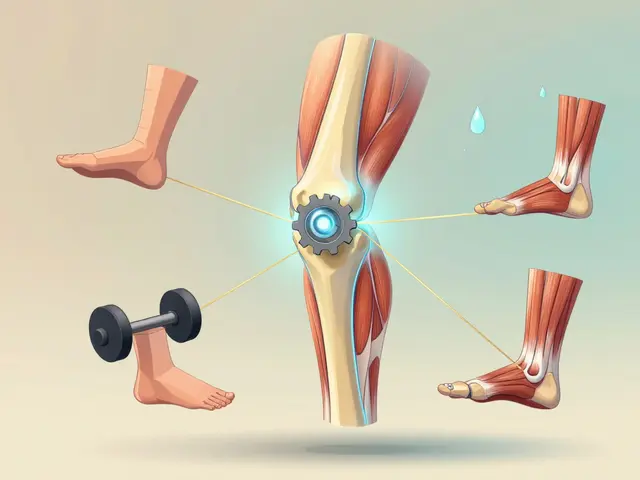
Understanding Hypoparathyroidism and Alfacalcidol
Hypoparathyroidism is a rare disorder characterized by the insufficient production of parathyroid hormone (PTH) by the parathyroid glands. This hormone plays a crucial role in regulating calcium and phosphorus levels in the body. When PTH levels are too low, calcium levels in the blood decrease, leading to various symptoms such as muscle cramps, irritability, and even seizures. One of the medications used to manage this condition is alfacalcidol, a synthetic form of vitamin D. In this article, we will discuss how alfacalcidol helps in the management of hypoparathyroidism, and why it is an essential part of treatment for this condition.
Alfacalcidol: A Vitamin D Analogue with Unique Benefits
Alfacalcidol is a type of vitamin D analogue, which means that it is a synthetic version of the naturally occurring hormone. It is designed to mimic the effects of the active form of vitamin D, called calcitriol. Calcitriol is responsible for maintaining calcium and phosphorus balance in the body, which is crucial for the normal functioning of the bones, muscles, and nerves. This synthetic version of vitamin D has some unique benefits compared to the natural hormone, making it a valuable tool in the management of hypoparathyroidism.
How Alfacalcidol Works in the Body
When taken as a supplement, alfacalcidol is quickly absorbed by the body and converted into its active form, calcitriol. This active form then binds to specific receptors in the body called vitamin D receptors (VDRs). These receptors are present in various tissues, including the bones, intestines, and kidneys. When calcitriol binds to these receptors, it stimulates the absorption of calcium and phosphorus from the intestines and promotes the release of calcium from the bones, thus helping to maintain normal calcium levels in the blood.
Alfacalcidol in the Management of Hypoparathyroidism
Alfacalcidol has been shown to be effective in managing the symptoms and complications associated with hypoparathyroidism. Here are some ways in which this medication can help patients with this condition:
1. Improving Calcium Absorption
As mentioned earlier, alfacalcidol helps the body absorb calcium from the intestines. This is particularly important for patients with hypoparathyroidism, as their bodies struggle to maintain normal calcium levels due to the lack of PTH. By increasing calcium absorption, alfacalcidol helps to maintain healthy calcium levels in the blood, preventing the symptoms and complications associated with low calcium levels.
2. Reducing Bone Loss
PTH plays a crucial role in maintaining bone health by regulating the balance between bone formation and resorption. In hypoparathyroidism, the lack of PTH can lead to increased bone loss, as the body tries to maintain normal calcium levels by breaking down bone tissue. Alfacalcidol helps to prevent this bone loss by promoting the release of calcium from the bones in a controlled manner, thus preserving bone density and reducing the risk of fractures.
3. Managing Muscle Weakness and Cramps
Low calcium levels can cause muscle weakness and cramps, which are common symptoms of hypoparathyroidism. Alfacalcidol helps to alleviate these symptoms by maintaining normal calcium levels in the blood, ensuring that the muscles can function properly. Patients who take alfacalcidol often report improvements in muscle strength and a reduction in muscle cramps.
4. Reducing the Risk of Kidney Stones
Patients with hypoparathyroidism are at an increased risk of developing kidney stones due to the imbalance of calcium and phosphorus in their bodies. Alfacalcidol can help to reduce this risk by promoting the excretion of excess phosphorus from the body, thus preventing the formation of kidney stones.
Important Considerations When Taking Alfacalcidol
While alfacalcidol can be a valuable tool in the management of hypoparathyroidism, it is essential to follow your doctor's instructions and monitor your calcium and phosphorus levels regularly. Overdosing on alfacalcidol can lead to hypercalcemia (high calcium levels), which can cause serious health complications. It is also crucial to maintain a balanced diet that is rich in calcium and low in phosphorus to ensure optimal results from alfacalcidol treatment.
Conclusion
In conclusion, alfacalcidol is an effective medication for managing hypoparathyroidism and its associated symptoms and complications. By mimicking the effects of the active form of vitamin D, alfacalcidol helps to maintain normal calcium levels in the blood, improve bone health, and alleviate muscle weakness and cramps. If you have hypoparathyroidism, alfacalcidol can be a valuable part of your treatment plan. However, it is essential to follow your doctor's instructions and monitor your calcium and phosphorus levels to ensure the best possible outcomes from this medication.



15 Comments
Great summary! Alfacalcidol really does a lot to keep calcium levels steady, and that helps with those nasty muscle cramps. Just remember to have your doctor check blood work regularly, because too much can cause problems too. Stay positive and keep up with your treatment plan.
/p>Everything the pharma industry hides about vitamin D is terrifying.
/p>Well, look at that, another shiny pill to pretend we’re not messing up our diets. Kudos to the scientists, though – at least they finally gave us something that works.
/p>Oh wow, alfacalcidol is like a superhero for people with hypoparathyroidism! 🌟 It swoops in, boosts calcium, and even saves the bones from crumbling. Keep your doctor in the loop and you’ll feel the difference.
/p>Don’t think a tiny dose won’t mess you up – you must *stay* on top of those labs! And stop assuming it’s a cure‑all.
/p>Alfacalcidol can be a solid addition to therapy, but it’s crucial to pair it with dietary advice. Keep an eye on phosphate intake and monitor calcium levels regularly. It’s all about balance.
/p>One of the most important aspects of using alfacalcidol in hypoparathyroidism management is the vigilant monitoring of serum calcium and phosphate levels, because the therapeutic window is relatively narrow. Patients should have blood drawn at baseline, then after dose adjustments, typically within two weeks, to assess for hypercalcemia or hypophosphatemia. The dosage of alfacalcidol often starts low, such as 0.25 µg per day, and is titrated upwards in increments of 0.25 µg to achieve target calcium concentrations, usually between 2.1 and 2.3 mmol/L. Excessive calcium can precipitate in soft tissues, leading to nephrocalcinosis, so regular renal ultrasounds are advised for long‑term users. Moreover, dietary calcium intake should be optimized, aiming for about 1,000–1,200 mg per day, while phosphorus-rich foods like dairy and processed meats should be moderated. Vitamin D status should also be assessed; some clinicians check 25‑hydroxy vitamin D levels to ensure that endogenous pathways are not further compromised. It’s worth noting that alfacalcidol bypasses hepatic 25‑hydroxylation, which makes it especially useful in patients with liver dysfunction. However, the lack of this conversion step also means that the drug’s half‑life is longer, reinforcing the need for cautious dose escalation. Patient education is paramount: they should be aware of symptoms of hypercalcemia such as nausea, polyuria, and confusion, and know when to seek immediate medical attention. In addition, concurrent use of thiazide diuretics can potentiate calcium retention, so medication reconciliation is essential. Some clinicians also recommend calcium carbonate as a supplement because it can double as an antacid, but this should be balanced against its potential to increase calcium load. Regular bone density scans (DEXA) can help evaluate the long‑term effects of therapy on bone health, especially since alfacalcidol can reduce bone turnover. Finally, the psychosocial impact of chronic disease management should not be overlooked; support groups and counseling can improve adherence and quality of life. In summary, alfacalcidol is a valuable tool, but its successful use hinges on meticulous monitoring, patient education, and a multidisciplinary approach.
/p>One must ask whether we are truly addressing the root cause or merely applying a pharmaceutical Band‑Aid. The moral imperative is to question the over‑reliance on synthetic analogues when lifestyle modifications could suffice.
/p>Honestly, the whole thing feels like a massive over‑complication for a simple deficiency, but i guess if it works, it works. Just make sure you’re not over‑dosing, okay?
/p>The alchemy of turning sunlight into bone strength is a poetic reminder that our bodies are tiny universes.
/p>Surely, one must remember, alfacalcidol, despite its efficacy, should be paired, carefully, with diet, and, of course, regular labs.
/p>Team effort here – keeping calcium stable is a group project! Let’s stay motivated and share any tips that worked.
/p>Remember, you can’t just pop a pill and ignore the rest – diet, monitoring, and lifestyle matter just as much.
/p>Got any easy food swaps that keep phosphorus low?
/p>Technically, alfacalcidol bypasses hepatic 25‑hydroxylation, which is why it’s preferred in hepatic impairment. However, dosage must be individualized based on serial calcium measurements.
/p>